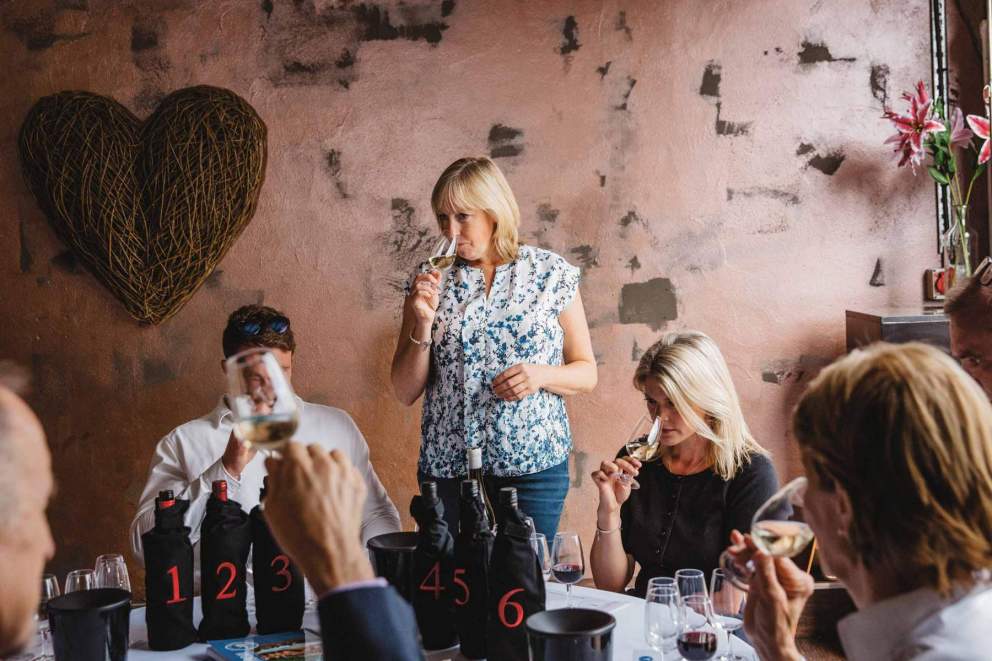Martin Hesp talks to local food and drink companies about the recent surge in interest in courses and experiences across the region

Food and drink courses on all manner of subjects – from kombucha-making to grape-crushing – are becoming increasingly popular. We ask local producers what’s behind this.
Liz Orgill of Owens Organic Coffee says: “We saw a rise in the run-up to the first lockdown. There has been a trend in the last five years towards buying experiences to be shared with friends and family and less about buying ‘things’.
“Food experiences and courses satisfy a need to fill increasing leisure time and divert spending so that customers are accumulating less wasteful things,” adds Liz, whose company runs successful barista courses at its state-of-the-art roastery near Ivybridge. “It can even save money for savvy customers who want to do more entertaining at home or improve the way they cook and use up ingredients, or (in our case) learn expert tips on making consistently better coffee using equipment they already have.”
Phil Oram of The Pure Stock Co agrees: “The lockdowns not only spurred people on to research new experiences online, they also forced chefs to turn to online platforms to offer the ‘dine out experience’ at home. With more time and disposable income, many have fallen in love with food and discovered a renewed appreciation of where the food they eat comes from.
“As pure stock is the foundation of many recipes, demand has increased. We stepped up production and increased our online presence, as well as marketing on social media to educate and raise awareness. We added more recipe demos to inspire cooks at home and collaborated on a recipe with a restaurant who ventured into meal kits to include our stock during lockdown,” adds Phil.
Agnes Finlayson of the Dartington Hall Trust adds: “We have seen an increased interest in foodie courses. People want to know more about what they are consuming. Not only in terms of sustainability and regenerative practices which benefit the planet, but also to get up close and personal.
“Our learning philosophy at Dartington is ‘head, heart and hands’, so we connect in a different way, whether that is learning about the 8,000-year history of goat’s curd or putting your feet in a bucket of grapes. We’ve also seen an increase in the gifting of experiences,” says Agnes.
It is a similar story at the Dartmouth Distillery Company, according to managing director Lance Whitehead. “People want to know more about where products are sourced from and how they are made. This, coupled with the growing popularity of lifestyle experiences, has led to a strong increase in demand in our courses.”
Dannee McGuire from Roly’s Fudge observes: “The high street is facing exciting new changes. Major retail bosses are heading in a more experience-led direction. Making fudge in front of customers is core to our business – we wouldn’t be the same without it.”
Eaoifa Forward at Boo Chi Organic Kombucha tells us: “We are planning to run kombucha-making workshops at our microbrewery and reaching out to other businesses to host a workshop in their space too.”
Salcombe Brewery’s John Tiner says: “The British public has never been more interested in how their food and drink is made. Over the past decade, there has been an increasing thirst for knowledge when it comes to provenance and quality.
“Our brewery tours are the perfect opportunity to get up close and personal and learn about our ethos. It’s a chance to see where and how our beers are made. The icing on the cake is the beer tasting where the beers are brought to life as we provide background detail and highlight the complexity of the flavours,” explains John.
What about those companies whose purpose is to provide specialist information and education? Jonathan Reynolds of the South West Wine School says: “During lockdown, people have had to eat and drink at home, forcing them to look at their skill set, knowledge and repertoire. This provided them with a heightened curiosity about where their food and drink comes from and how it is produced.”
Jazzi Curley, founder and tutor at the Devon Cookery School, says: “The uptake in food and drink experiences has definitely increased during lockdown – with a lot of people having extra time to cook, or simply having no choice due to a lack of places to eat out.
“Our business started during the pandemic in 2020. We switched to online classes then – and now we’ve created a relaxed and fun environment to learn about new dishes.”
Jazzi believes the trend for courses and experiences will grow. She says: “There is a massive increase in people cooking from scratch and being more eco-aware, plus a demand for experiences with friends and family.”
Agnes concludes: “We are very excited by new partnerships and building on those we have with our neighbours. We do food and drink so well in Devon, why would you want to go anywhere else?
As part of its ongoing media partnership with Taste Buds, this is a series of articles written by Food Drink Devon.
Six times a year, delivered to your door
Annual subscription: £15
Single Issue: £3
July August 2024 issue out now
Try before you buy. View digital edition
Go to Shop